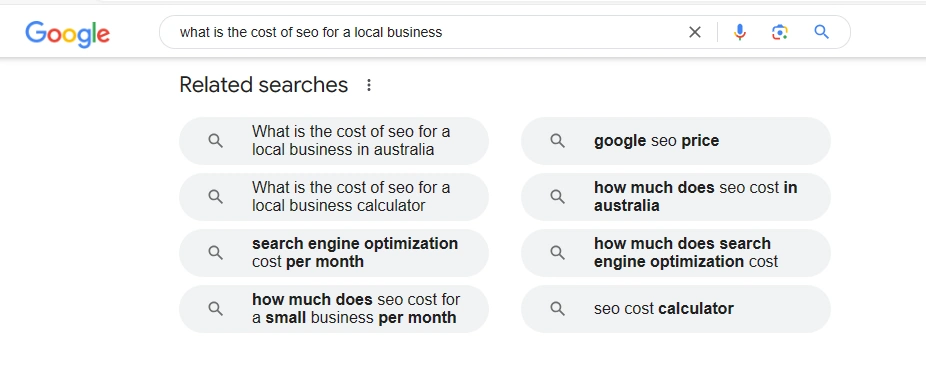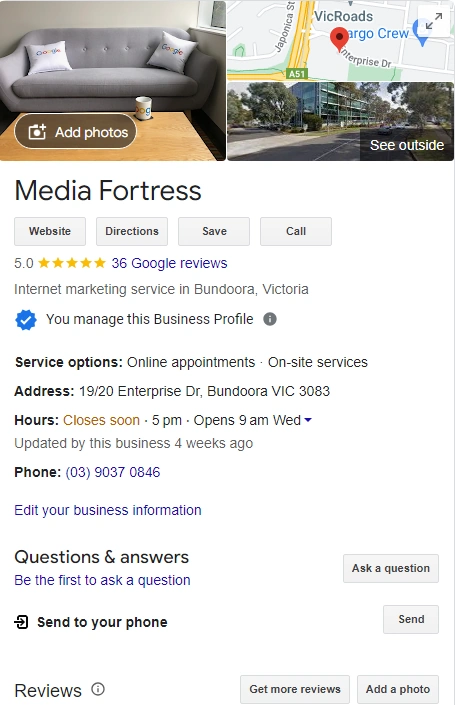Search Engine Optimisation or as it is commonly known “SEO” is the art of ranking your website on the first page of Google. Even if you intend on hiring a SEO or marketing agency these easy tips will help you understand the basics of SEO. SEO for Small Business is often overlooked by SEO agencies so let’s get started.
Note: This article has been updated for 2024
1. Install Google Analytics and Google Search Console
Google Analytics provides a range of data that can assist you track your website’s performance, keywords, user landing pages and for more advanced users, you can even track conversions and where your customers are dropping off without converting. Google replaced it’s Universal Analytics towards the end of 2023 with GA4. GA4 is considerably different from UA for example: Universal Analytics highlights Total Users (shown as Users) in most reports, whereas GA4 focuses on Active Users (also shown as Users) read more.
GA4 is a great tool to help you test different metrics to help improve conversions. Even if your SEO agency is sending you a monthly report it’s a great tool for you to use to track your online marketing success.
Google Webmaster Tools Search Console is a similar product. Search Console was previously called Google Webmaster Tools.
Search Console allows you to track the performance of search queries performed by Google search users. It will show you keyword data, it’s position globally and locally (by country) as well as what device your users are using such as Desktop Vs Mobile. If you want more precise information like What Browser or Operating System that is covered in Google Analytics.
Bing also has a similar tool and I recommend you also give it a try as it does produce different keywords that can help you optimise your page for users.
2. Give Focus To Each Page You’re Optimising
Google and other search engines, much like humans, like information to be clear, relevant with the goal of the page to satisfy user intent. Search engines want your page to be able to answer the user query without the user having to return to the search engine to perform the search again.
Search Engine Spiders crawl your website’s content. They are looking for easily read content that is clear and precise. Put yourself in the users’ shoes, it’s fine (and recommended) to link to other parts of your website and other websites but if you’re promoting dog collars then your user and search engine spider probably don’t need to know about the car repairs you do on the weekend within the same article. This isn’t the greatest example, but I am being broad to give you an understanding.
Another example might be that this page you are reading now talks about small business SEO, so at some stage I should probably mention some points that are very specific to small businesses.
The main thing to remember is to give each page focus and make sure it’s evident from the minute the user arrives.
Additionally
If you are struggling to understand how your web page should look in the eyes of search engines, I think this example from WordPress template makes it very clear.
As you can see on this sample page the structure of the page is simple and thought out, with many elements that you can include on page. Starting from the top we can see:
- Hero Image
- Heading Elements
- Paragraph
- List Types
- Forms
- Tables
Search Engine Optimisers will often refer to this stuff as HTML to Content Ratio, which is an industry term and kind of confusing but for the majority of time, this is what they are referring too.
You might want to think about your own Content to Html Ratio. For example, you can improve your content to html ratio by adding a YouTube embedded video that you have created or provides more value for your page. This can improve “hang time” (another industry term) which means the user will stay on the page longer, which is said to be a ranking factor.
3. Focus on User Experience
Once we have our content right and users are visiting our website, we want to ensure that they have a good experience. If you’re selling a product or service, make sure the user can get from A to B to C without too much difficulty. A good example of this might be if you’re selling 3 products, with 3 prices, have the user filter through from your landing page easily to check out. Make it as simple as possible. You probably have a friend who is hopeless with computers, get them to test it out and see if they can easily check out your product.
User experience is an extremely high ranking factor. If your website visitors search a term in Google, land on your page, hang around for a while, click a few links and don’t return to Google for a similar search your rankings will may go up organically.
4. Offer Promotional Codes On-site
Everyone loves a bargain and many check out carts come with a pre-installed coupon function. Don’t let users leave your site. If your checkout offers a promotion coupon code, offer it right there so they don’t need to go looking. “Use code 50OFF for 50% off your first invoice”.
How many times have you seen one of these promotional codes only to go looking for one and then end up on something entirely unrelated. By the time you come back, you’ve either lost interest or decide the computers been on long enough and you will try again tomorrow. The user may not remember your website or the term they found you with.
Offer the promotional code on your site so your website visitor does not need to search for it. And if they do, they are probably price checking you against your competitors.
5. Get Reviews For Your Business
It’s a fact that people trust other clients opinions and experiences so getting online reviews is part of this process for the users performing their due diligence.
Ask clients to leave reviews on other reliable sources like Google Business pages, Product Review and Facebook. Look at who other providers in your area are using.
It’s a good idea to not have users sign up for services like Google Local for the pure reason of leaving a review. You should also not try to attempt to game their system by putting up fake reviews. They are smarter than you think. Instead give your users a reason to leave a positive review. This maybe a gift, a discount or just excellent service. (Offering something in return for a review is frowned upon and against many review providers terms of service, consider the rules before running promotions to generate reviews and testimonials).
You do need to monitor your online reviews. Inevitably you may get a bad review. These really are unavoidable for many, you can’t please everyone all the time. What is important is how you respond to the user. Make sure their concerns are covered in your reply and what you’re doing to rectify the issue they experienced. Customers don’t expect businesses to have a 100% positive rating but dealing with bad reviews professionally will back up the service or product you are offering.
Additionally
Respond to reviews. Apart from it being the polite thing to do, users tend to prefer companies that are active and respond to online queries that are good and bad.
6. Claim Your Business Pages
There are many content creators that scrape the internet. These include directories that you may have never have heard of. Sometimes they are auto generated by companies working in affiliation with other companies. So if you don’t read those terms and conditions thoroughly you may find your website and business listing is listed on several websites.
Name Address Place (NAP) is an important factor for websites serving a local area and trying to rank in Googles business listings. Ensure your address, phone number, business name and even web address are listed the same way across all of these websites.
Tip: use your local number, if you have a Toll free number add that number as a secondary number.
7. Backlinks
I better explain what a backlink is because I get asked this question a lot.
A backlink is a link on another website that links to your website or website page. There are different types of backlinks such as:
- Naked link – https://mediafortress.com.au
- Branded link – Media Fortress
- Partial Anchor match –Media Fortress SEO
- Full Anchored match – Small Business SEO Tips for 2024 (which would normally click through to this page you are reading now)
Backlinks help Google crawl the internet. They are also a ranking factor (yes, still in 2024). The amount of backlinks you need varies vastly depending on competition levels, age of your business and many other factors.
Be careful when getting a backlink as Google is wary of users trying to manipulate their ranking system with fake back links. These can include low value links from anything that doesn’t require editorial discretion or links that have been paid for.
Most often a website targeting Full Anchored match is going to be the most likely to set off red flags for Google Bot. It’s important to not manipulate search engines.
So how do you generate backlinks in a way that Google likes? Create great content, share it on social media channels. If you’ve got a great story, let the world know about it. Email is still a great tool too.
8. Keyword Research
Keyword Research for SMBs
How do we get the best information for this new page?
- What is your offer?
- What is the cost?
- How long will it take?
To do that we simply take our keyword to Google search and use the engine to provide a list of queries that their users have searched for before. Scroll down the page for your search term and look at Related searches:

At the end of the day there are many aspects to ranking well in Google and other search engines. These are just a few that many business owners can start with right away to help their online visibility.
Need help? Contact us for a free 30 minute strategy call to help improve your website SEO.


